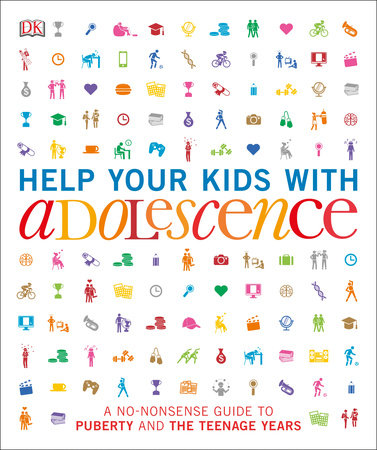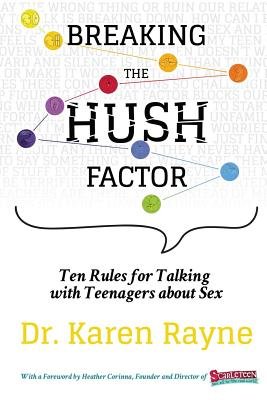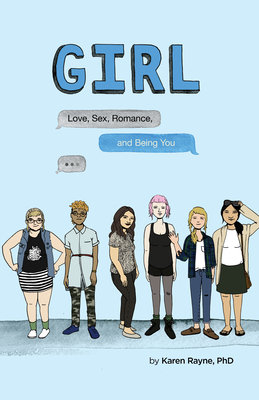I have a 9-year-old girl — and almost daily I catch myself in a panic spiral about the years directly ahead of us. Luckily, I — and others like me — don’t have to go it alone. Dr. Karen Rayne is here to help. Sexuality educator, speaker, and self-proclaimed “parent supporter,” she’s written extensively about the adolescent animal, tackling the topical and the taboo in books such as Breaking the Hush Factor: Ten Rules for Talking with Teenagers about Sex and the forthcoming GIRL: Love, Sex, Romance, and Being You.
She’s also the consulting editor of DK’s Help Your Kids with Adolescence, a broad-based compendium of all things adolescence, from changing bodies to cyberbullying, money management to test anxiety — and just about everything in between. It’s meant to be a co-viewing resource for parents who just want to know what the heck is going on with their tweens and teens, and for kids who can’t believe how much their parents just don’t get it. I think of it as an encyclopedia that explains this wild and wooly time.
I caught up with Dr. Rayne after her visit to the American Association of Sexuality Educators, Counselors and Therapists (AASECT) annual conference, where early copies of Help Your Kids with Adolescence were met with overwhelmingly positive feedback.
I devoured pregnancy and baby books way back when — and those are fairly universal, developmentally. But puberty! Adolescence! It seems so individual. Are there some universal truths?
Yes, there are universal truths. They are not relevant week to week though — or even year to year. There are 12-year-olds who are much closer to a 15-year-old, and some 12- year-olds closer to a 9-year-old, developmentally. There’s a dramatic range and, I think especially in these pre-teen and early teen years, the range widens [even more] dramatically.
It’s about getting to know your particular teen.
What’s the one thing that every parent gets wrong about adolescence?
Well, I hope there’s not one thing that every parent gets wrong. But, generally speaking, there are two.
One is that parents try to make guesses as to where their kids are in their sexual development. I don’t think that they can, at least not with any reasonable guarantee of being correct. Some parents assume their kids are having sex, and they are not having sex. Some parents think, “There’s no way my kids are having sex” — and those kids are totally having sex.
The other is the assumption that, “Oh, this is what my kid is like at home, so that’s what my child is like everywhere.” All of us, we’re a little different depending on where we are. I’m different when I’m alone with my spouse or out with my friends. How we choose to express ourselves can depend on the expectations of people around us — and the opportunities presented by the people around us. Middle schoolers are no different.
What’s the hardest topic to broach for parents?
It depends on the parent. For me, I talk about sex all day long. It’s fairly easy for me to bring it up. My kids will ask, “What did you to today?” and it’ll be something about sexuality.
But don’t ask me to talk about drugs. My co-parent and I made a deal — I talk about sex, you talk about drugs.
What’s the hardest topic for teens? I’m guessing these are different.
The same thing applies: It depends on the teen. But, if I’m generalizing, it’s hard for teens to talk about personal failure, regardless of the subject area. Kids don’t want to let parents see them failing.
What are some simple tips for starting these difficult or awkward conversations — or for keeping them going?
I love media so much — the representations of relationships and sexuality are so bad, by and large, that it gives ample opportunities for dialogue. I talk with my kids about song lyrics as they come up, but also movies and TV shows, books that are being read, anything related to stories about the human condition. It could be about gender, legal issues, reproductive anatomy, healthy relationships — there’s always a way in. Parents can take advantage of that.
And I love a book like Help Your Kids With Adolescence. Having a book like this around, when a question comes up in the media, you can say, “Hey, let’s go read a little bit about it.” It’s age-appropriate, and not too heavy.
Do you have advice for parents for staying in tune with what the kids are doing these days?
You won’t! I find that acknowledging that and releasing it as something you need is helpful. You don’t have to try and keep up or be watching the same things and knowing the information prior to your teen accessing it. The best thing to do is to try and find out what she’s interested in and what she’s doing — and show interest.
What are her specific interests, which might be different from my teen’s interests? One of the perks of being a parent is that you only have to focus on your kid.
What are some of the resources you recommend? For parents, teens or both?
It depends on the need.
Help Your Kids With Adolescence is a general resource for the preteen and early teen audience. There’s not a lot out there for them, which is why I’m so excited about this book.
There’s a dearth of books in that critical age range. There are lots of books for kids and a decent selection for teenagers in the 15-plus set. But we’re missing that 10- to 14-year-old range. Middle school age, it’s the forgotten years.
This interview has been edited for length and clarity.
-
Books by Dr. Rayne
-



